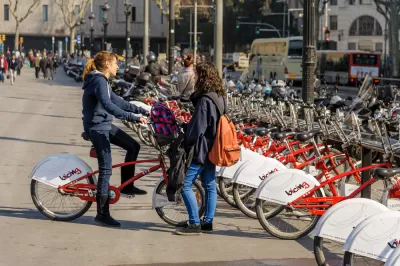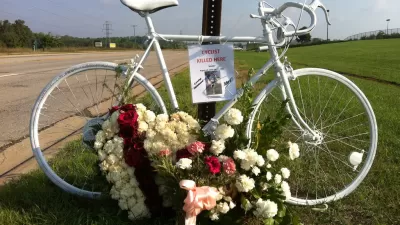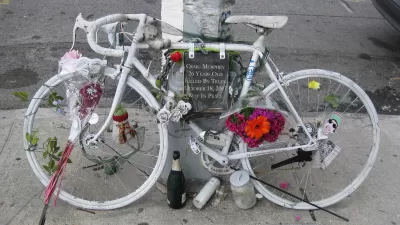In the United States, not a single bikeshare rider has died in an accident so far. A report from the Mineta Transportation Institute considers why bikeshare may be safer than conventional biking.

While regular cyclists contend with the very real possibility of fatal crashes as they navigate vehicular streets, bikeshare riders have so far been spared. That's not to say bikeshare users haven't been involved in accidents and injuries, but none have died in the United States since the first systems were deployed last decade.
Brad Plumer writes, "A new report [pdf] from the Mineta Transportation Institute sifts through data from bike-share systems in Washington, DC, San Francisco, and Minneapolis. They found that bike-share bikes had lower collision and injury rates than personal bikes in all three cities. In DC, the collision rate for bike share was 35 percent lower." Below are some of the reasons from the report that might explain this phenomenon.
- Bikes in bikeshare systems tend to be heavier, with wider tires and bright, noticeable colors
- Bikeshare usually operates in downtown areas where drivers are more alert to pedestrians and cyclists
- Riders tend to be less experienced, and thus more cautious
- Riders often lack helmets, which may encourage drivers to be more cautious as they pass
- While some have suggested that bikeshare promotes "safety in numbers," the report found no clear evidence of this (although separate findings have shown correlations in some areas between bike numbers and overall road safety)
FULL STORY: A new study looks at why bike share is so much safer than regular biking

Trump Administration Could Effectively End Housing Voucher Program
Federal officials are eyeing major cuts to the Section 8 program that helps millions of low-income households pay rent.

Planetizen Federal Action Tracker
A weekly monitor of how Trump’s orders and actions are impacting planners and planning in America.

Ken Jennings Launches Transit Web Series
The Jeopardy champ wants you to ride public transit.

Driving Equity and Clean Air: California Invests in Greener School Transportation
California has awarded $500 million to fund 1,000 zero-emission school buses and chargers for educational agencies as part of its effort to reduce pollution, improve student health, and accelerate the transition to clean transportation.

Congress Moves to End Reconnecting Communities and Related Grants
The House Transportation and Infrastructure Committee moved to rescind funding for the Neighborhood Equity and Access program, which funds highway removals, freeway caps, transit projects, pedestrian infrastructure, and more.

From Throughway to Public Space: Taking Back the American Street
How the Covid-19 pandemic taught us new ways to reclaim city streets from cars.
Urban Design for Planners 1: Software Tools
This six-course series explores essential urban design concepts using open source software and equips planners with the tools they need to participate fully in the urban design process.
Planning for Universal Design
Learn the tools for implementing Universal Design in planning regulations.
Heyer Gruel & Associates PA
Ada County Highway District
Institute for Housing and Urban Development Studies (IHS)
City of Grandview
Harvard GSD Executive Education
Toledo-Lucas County Plan Commissions
Salt Lake City
NYU Wagner Graduate School of Public Service





























